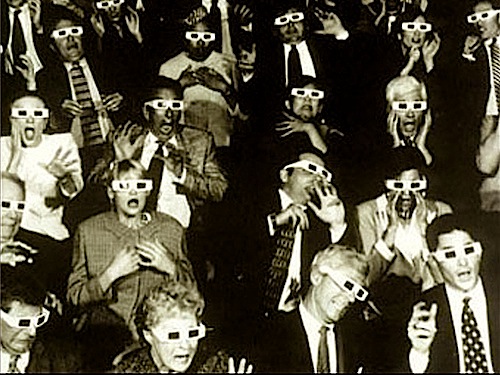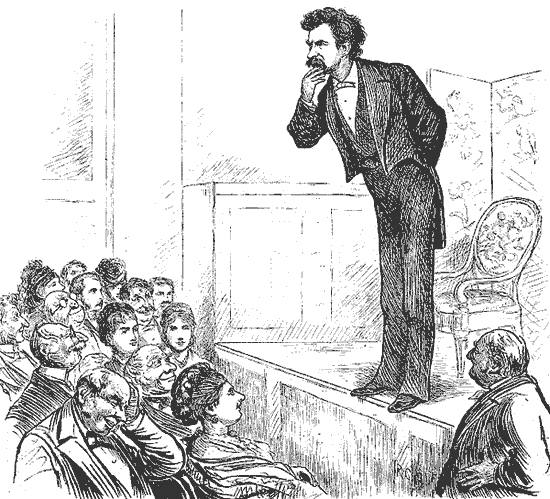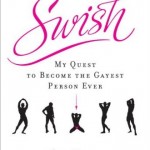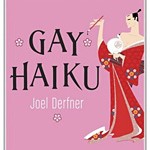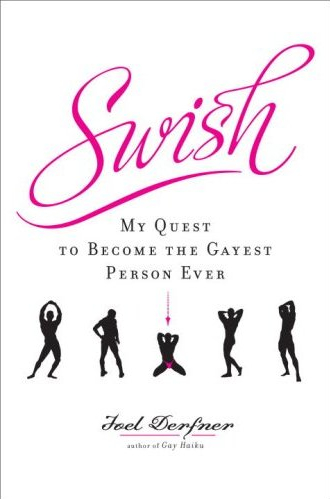





Are some of you still feeling a bit shell-shocked after this morning’s Querypalooza post? I wouldn’t be at all surprised if you were: in it, I set out a very basic structure for a query letter. In deference to everyone’s possibly strained nerves, I’m going to take it a bit more gently in this post, assuaging the fears of the nervous, adding nuances to the prototype, and generally spreading joy and enlightenment abroad.
And then I’m going to plunge you back into shock again. Don’t say I didn’t warn you. It’s for your own good, I promise.
Querying, I think we can all agree, is a necessary evil: no one likes it. It generates a whole lot of inconvenience for writer and agency alike, and to engage in it is to put one’s ego on the line in a very fundamental way.
Rejection hurts, and you can’t be rejected if you never send out your work, right? So you can either try to lie low, keeping your dreams to yourself, or you can attempt to approach those high-and-mighty gatekeepers of the industry, asking to be let inside the Emerald City.
Sounds a lot like high school social dynamics, doesn’t it?
Just as many people stay away from their high school reunions because they fear exposing themselves to the judgment of people whom past experience has led them to believe to be, well, kinda shallow and hurtful, many, many writers avoid querying, or give up after just a handful of queries, because they fear to be rejected by folks they have heard are — wait for it — kinda shallow and prone to be hurtful.
There are a variety of ways to deal with such fears. One could, for instance, not query at all, and resign oneself to that great novel or brilliant nonfiction book’s never being published. Alternatively, one could query just a couple of times, then give up.
Or — and if you haven’t guessed by now, this would be my preferred option — you could recognize that while some of the people at the reunion may in fact turn out to be kind of unpleasant, you really only need to find the one delightful person who finds you truly fascinating to make the entire enterprise worthwhile.
You’ll be pleased to hear, though, that unlike a hapless ex-school kid gearing up to attend a reunion, there are certain things an aspiring writer can do before querying to increase the probability of a positive reception. Certain elements mark a query letter as coming from someone who has taken the time to learn how the publishing industry works.
Agents like writers who bother to do that, you know, and with good reason. Such new clients are much less time-consuming than those whose ideas of how books are sold bear only scant relation to reality. Aspiring writers harboring unrealistic expectations tend not only to express resentment when their work encounters stumbling-blocks — they often end up feeling disappointed when things are going well.
I just mention.
The query letter structure I proposed last time — which is, I must reiterate, NOT the only one possible by any means, or even the only one that works; it’s just what has worked best in my experience — also frees the writer from the well-nigh impossible task of trying to cram everything good about a book into a single page. Which is, I have noticed over the years, precisely what most aspiring writers try to do.
No wonder they get intimidated and frustrated long before they query the 50 or 100 agents (yes, you read that correctly) it often takes these days for a good book to find the right fit. To put this in perspective, a truly talented writer might well end up querying the equivalent of my entire high school graduating class before being signed.
Believe it or not, masses of rejected queries are not necessarily a reflection on the manuscript in question. Rejection is often a function of heavy competition, agent specialization, and aspiring writers not being aware of what information a query letter is supposed to contain.
Apart from doing the necessary homework to get a query that DOES contain the right information onto the desk of an agent who does habitually represent that type of book, the only way that I know to speed up that process is to make the query letter itself businesslike, but personable.
Don’t tense up — I’m not talking about spilling your soul onto a single sheet of paper. I’m talking about making your query letter unique.
And not in the all-too-common misdefinition of the word as a synonym for special. I mean unique in its proper sense of one of a kind.
A tall order, you say? Well, keep in mind that the SOLE purpose of the query is to engender enough excitement in an agent (or, more commonly, in Millicent the agency screener: it is rare for agents at the larger agencies to screen query letters themselves; thus Millicent’s being the one to get the paper cuts) that she will ask to see a representative chunk of the book itself, not to reproduce what you would like to see on the book’s back jacket or to complain about having to work through an agent at all.
If either of the last two options made you chuckle in disbelief, good. Believe it or not, I’ve seen both turn up many, many times in unsuccessful query letters. Boasting and petulance both abound, and both tend to discourage positive response.
Now, I know that my readers are too savvy to do either of those things deliberately, but isn’t it worth sitting down with your query letter and asking yourself: could an exhausted Millicent — in a bad mood, with a cold, having just broken up with her boyfriend AND burned her lip on that over-hot latte yet again — possibly construe that letter as either?
Yes, querying is a chore, and an intimidating one at that; yes, ultimately it will be the agent’s job, not yours, to market your work to publishers, and an agent or editor probably would have a far better idea of how to spin your book than you would.
Agents and their screeners are in fact aware of all of these things. You don’t need to tell them.
Your query letter needs to market your book impeccably anyway, in a tone that makes you sound like an author who LOVES his work and is eager to give agent and editor alike huge amounts of his time to promote it. Not a walk in the park, definitely, but certainly doable by a smart, talented writer who approaches it in the right spirit.
Sound like anyone you know?
So start thinking, please, about how to make your query the one that waltzes into the reunion with a positive attitude, not the one who storms in with a chip on its little shoulder. Or, heaven forefend, the one that doesn’t stick its nose through the door at all.
The gates of the Emerald City are not going to open unless you knock, people. The only manuscript that has absolutely no chance of getting published is the one that is never queried or pitched.
Yet even as I typed that, I could sense some ardor-deflation out there. “”My God,” the little voice in the back of my head which I choose to attribute to my readership is saying, “how is all of that possible within the context of a single-page missive? How can I cram all I need to say to grab their attention in that little space, much less seem unique while doing it?”
Um, are you sitting down? You don’t actually have the entire page to catch their attention; to be on the safe side, figure you have only about five lines to convince them to keep reading.
Yes, you read that correctly. While you already have the heart medication and/or asthma inhaler at the ready, it seems like a good time to add: most query letters are not even read to their ends by Millicent and her ilk.
Are you rending your garments and shouting, “Why, oh Lord, why?” Because the vast majority of query letters disqualify themselves from serious consideration before the end of the opening paragraph.
Hey, I told you to sit down first.
At the risk of repeating myself, this is largely attributable to aspiring writers’ not being aware of what information a query letter should and should not contain. Unfortunately, Americans are so heavily exposed to hard-sell techniques that many aspiring writers make the mistake of using their query letters to batter the agent with predictions of future greatness so over-inflated (and, from the agent’s point of view, so apparently groundless, coming from a previously unpublished writer) that they may be dismissed out of hand.
Like what, you ask? Here are some popular favorites:
This is the next (fill in name of bestseller here)!
You’ll be sorry if you let this one pass by!
Everyone in the country will want to read this book!
Women everywhere will want to buy this book!
It’s a natural for Oprah!
This book is like nothing else on the market!
I hate to burst anyone’s bubble (yet I do seem to be doing it quite a bit lately, don’t I?), but to professional eyes, these are all absurd statements to discover in a query letter. Yes, even if the book in question IS the next DA VINCI CODE.
Why? Because these aren’t descriptions of the book; they’re back-jacket blurbs, marketing copy, equally applicable to (and equally likely to be true about) any manuscript that crosses their desks.
After one has heard the same claim 1500 times, it starts to lose a little vim. “Why do these queriers keep telling me that their books are unique?” Millicent grumbles, reaching for her fourth latte of the afternoon. “Why aren’t they SHOWING me?”
Ah, there’s the rub: assertions like these simply are not as effective at establishing a writer’s ability or a story’s appeal as demonstrating both practically, through well-written sentences and a summary containing lively and unusual details. Even in the extremely rare instances that these statements aren’t just empty boasts based upon wishful thinking, consider: whose literary opinion would you be more likely to believe in Millicent’s shoes, the author’s vague claim of excellence about his own book or another reader’s recommendation?
To put it another way, if someone you’d never met before came up to you on the street and said, “Hey, I bake the world’s best mincemeat pies, the kind that can change your life in a single bite,” would you believe him? Would you trustingly place that total stranger’s good-looking (or not) slice of God-knows-what into your mouth?
Or would you want some assurances that, say, this hard-selling yahoo knows something about cooking, had produced the pie in a vermin-free kitchen, and/or hadn’t constructed the mincemeat out of ground-up domestic pets?
Oh, you may laugh, thinking that this isn’t really an apt parallel, but why would agents and editors’ desire to hear about a new writer’s past publication history — or educational background, or even platform — if NOT to try to figure out if that pie is made of reasonable materials and in a manner up to professional standards of production?
That’s why, in case you’ve been wondering, a good query letter includes what I like to call ECQLC, Eye-Catching Query Letter Candy, platform information and/or selling points that will make Millicent sit up and say either, “Wow, this writer has interesting credentials,” “Wow, this writer is uniquely qualified to tell this story,” and/or “Wow, this book has greater market appeal/a larger target audience/is significantly more important to human existence than I would have guessed.”
The crucial exclamation to elicit, obviously, is “Wow!” Not merely because Millicent honestly does enjoy discovering exciting new writing projects (yes, even though it’s her job to reject 98% of the ones that cross her desk), but because a query letter that mentions either the writer’s credentials or the book’s selling points is genuinely rare.
I sense some disgruntled muttering out there, do I not? “Here we go again, Anne,” some mutterers, well, mutter. “I can’t STAND it when the pros start rattling on about platform. Isn’t that just code for we’re not interested in taking a chance on previously unpublished authors?”
Actually, it isn’t. Agents and their Millicents don’t ask to see platform information in queries in order to seem exclusionary toward previously unpublished writers (okay, not merely to seem exclusionary). They want it to be there because specific references to specific past literary achievements are signals to a quick-scanning screener that this is a query letter to take seriously.
As will an opening paragraph that states clearly and concisely why the writer decided to query this agent, as opposed to any other; a well-crafted single-paragraph elevator speech for the book; some indication of the target market, and a polite, respectful tone.
The same basic elements, in short, as an effective verbal pitch.
Did some light bulbs just flicker on over some heads out there? That’s right, campers — the difference between a vague boast and solid information about your book and why THIS agent is the best fit for it is actually a show, don’t tell problem, at base. Part of your goal in the query letter is to demonstrate through your professional presentation of your project that this is a great book by an exciting new author, not just to say it.
So you might want to eschew such statements as, “My friends say this is the greatest novel since THE GRAPES OF WRATH. It’s also a natural for Oprah.” You can make better arguments for your manuscript’s relevance.
“But Anne,” I hear some of you protest, “my book really is a natural for Oprah! I’m going on her show next week!”
Well, congratulations — go ahead and open your query letter with the date of your appearance on the show, and the best of luck to you. For the overwhelming majority of you who have not already negotiated with her production staff, I would recommend against mentioning your book’s Oprah potential at all, either in the query letter or, if you write nonfiction, in the book proposal.
Why? Because, conservatively speaking, at least 40% of book proposals Millicent sees mention the possibility of appearing on Oprah. As will most marketing plans, a hefty percentage of verbal pitches, and a higher percentage of query letters than I even like to say.
What’s the result of all of that repetition? Usually, Millicent will simply stop reading if a query letter opens with an empty boast like that, because to her, including such statements is like a writer’s scrawling on the query in great big red letters, “I have absolutely no idea how the publishing industry works.” Which, while an interesting tactic, is unlikely to get an agent or her screener to invest an additional ten seconds in reading on to your next paragraph.
That’s right, I said ten seconds: as much as writers like to picture agents and their screeners agonizing over their missives, trying to decide if such a book is marketable or not, the average query remains under a decision-maker’s eyes for less than 30 seconds.
That doesn’t seem like a lot of time to make up one’s mind, does it? Actually, it is ample for a query letter rife with typos and unsubstantiated claims about how great the book is to turn a professional reader off.
Try not to blame Millicent for this. I can’t stress enough that agency screeners do not reject quickly merely to be mean. It’s their job, and to a certain extent, developing pet peeves and shortcuts is a necessary psychological defense for someone handling hundreds of people’s hopes and dreams in any given day’s work.
Even the best-intentioned Millicent might conceivably, after as short a time as a few weeks of screening queries, might start relying pretty heavily upon her first impressions. Consider, for instance, the English major’s assumption that business format is in fact not proper formatting for either query letters or manuscripts. Think about it from a screener’s point of view: it’s true, for one thing, and let’s face it, improper formatting is the single quickest flaw to spot in either a query or manuscript.
So why wouldn’t Millicent free up an extra few seconds in her day by rejecting paper query letters devoid of indentation on sight? Especially when empirical experience has shown her that aspiring writers who don’t use grammatically-necessary indentation in their query letters often eschew it in their manuscripts as well?
I’m hearing more huffing. “But Anne,” some of you demand indignantly, and who could blame you? “What does indentation have to do with the actual writing in a manuscript? Or a query, for that matter?”
Potentially plenty, from Millicent’s point of view: remember, the competition for both client spots at agencies and publication contracts is fierce enough that any established agent fill her typically scant new client quota hundreds of times over with technically perfect submissions: formatted correctly, spell- and grammar-checked to within an inch of their lives, AND original. So there’s just not a lot of incentive for her to give a query with formatting, spelling, or grammatical problems the benefit of the doubt.
Some of you still don’t believe me about the dangers of using business formatting, do you? Okay, let’s take a gander at what Millicent expects to see, a letter formatted observing standard English rules of paragraph-formation:
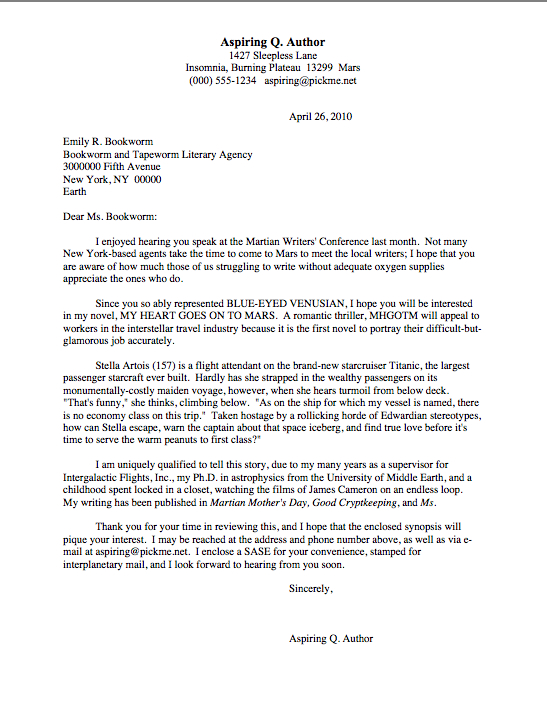
Now let’s take a look at exactly the same letter in business format:
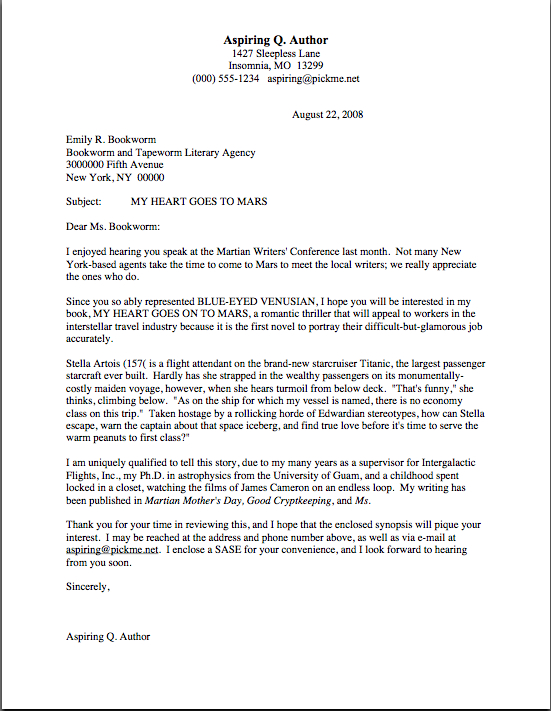
Interesting how different it is, isn’t it, considering that the words are identical? And isn’t it astonishing how many paces away a reader can be for the difference to be obvious?
One lone exception to the intent-your-paragraphs rule: in an e-mailed query, of course, the business format would be acceptable, but on paper, it’s not the best strategic choice. Ditto with requested materials, even if you are sending them via e-mail. (Unless her agency specifies otherwise, Millicent will expect you to send any requested pages as Word attachments, not as inserts in the body of an e-mail; thus, all pages should include indented text. FYI, agencies that tell queriers to include sample pages or chapters with their queries are not technically requesting material: they simply like for Millie to have more information at her fingertips before she makes a decision. For an in-depth discussion of the differences between query packets and submission packets, please see the HOW TO PUT TOGETHER A QUERY PACKET and HOW TO PUT TOGETHER A SUBMISSION PACKET on the archive list at right.)
Indented paragraphs are, to put it bluntly, the industry standard. Unfortunately, a lot of aspiring writers seem not to be aware that business format tends to be regarded as less-than-literate, regardless of whether it appears in a query letter, a marketing plan, or — heaven forfend! — a submitted manuscript. (If you don’t know why I felt the need to invoke various deities to prevent you from using business format your manuscripts, please run, don’t walk to the HOW TO FORMAT A MANUSCRIPT category at right.)
In fact, I am perpetually meeting writers at conferences and in classes who insist, sometimes angrily, that a query letter is a business letter, and thus should be formatted as such. They tell me that standards have changed, that e-mail has eliminated the need for observing traditional paragraph standards, that it’s the writing that counts, not the formatting.
I understand the logic, of course, but it simply doesn’t apply here: not all businesses work in the same way. As anyone who works in an agency or publishing house would no doubt be delighted to tell you, there are many, many ways in which publishing doesn’t work like any other kind of business. One does not, for instance, require an agent in order to become a success at selling shoes or to become a well-respected doctor.
If you’re looking for evidence of the biz’ exceptionalism, all you have to do is walk into a bookstore with a good literary fiction section. Find a book by a great up-and-coming author that’s sold only 500 copies since it came out last year, and ask yourself, “Would another kind of business have taken a chance like this, or would it concentrate on producing only what sells well? Would it continue to produce products like this year after year, decade after decade, out of a sense of devotion to the betterment of the human race?”
Okay, so some businesses would, but it’s certainly not the norm.
Yet almost invariably, when I try to tell them that publishing is an old-fashioned industry fond of its traditions, and that agents and their screeners tend to be people with great affection for the English language and its rules, I receive the same huffy reply from writers who dislike indenting: some version of, “Well, I heard/read/was told that a query/marketing plan had to be businesslike. Therefore, it must be in business format. QED, tradition-hugger.”
I’m always glad when they bring this up — because I strongly suspect that this particular notion is at the root of the surprisingly pervasive rumor that agents actually prefer business format. I can easily envision agents stating point-blank at conferences that they want to receive businesslike query letters.
But businesslike and business format are not the same thing. Businesslike means professional, market-savvy, not overly-familiar — in short, the kind of query letter we talked about last time.
Business format, on the other hand, doesn’t dictate any kind of content at all; it’s purely about how the page is put together. There’s absolutely nothing about this style, after all, that precludes opening a query with the threat, “You’ll regret it for the rest of your natural life if you let this book pass you by!”
All of these negative examples are lifted from actual query letters, by the way. My spies are everywhere.
All that being said, there’s another reason that I would strenuously advise against using business format in your query letters. A comparative glance at the two letters above will demonstrate why.
Take another look, then put yourself in Millicent’s shoes for a moment and ask yourself: based upon this particular writing sample, would you assume that Aspiring Q. Author was familiar with standard format? Would you expect Aspiring’s paragraphs to be indented, or for him/her (I have no idea which, I now realize) NOT to skip lines between paragraphs?
Okay, would your answer to those questions change if you had a hundred query letters to read before you could get out of the office for the day, and you’d just burned your lip on a too-hot latte? (Millicent never seems to learn, does she?)
No? Well, what if it also contained a typo within the first line or two, had odd margins, or began with, “This is the best book you’ll read this year!” or some similar piece of boasting? Wouldn’t you be at least a LITTLE tempted to draw some negative conclusions from the format?
Even if you wouldn’t, Millicent would — and perhaps even should. Why? Because although most aspiring writers seem not to be aware of it, every sentence a writer submits to an agency is a writing sample.
Even if the writer doesn’t treat it as such, a screener will. After all, when that stranger comes up to sell you a meat pie, you’re going to be looking for whatever clues you can to figure out if he’s on the up-and-up.
I can feel some of you getting depressed over this, but actually, I find it empowering that the high rejection rate is not arbitrary. Quick rejections are not about being mean or hating writers — they’re about plowing through the mountains of submissions that arrive constantly. The average agency receives 800-1200 queries per week (that’s not counting the post-Labor Day backlog or New Year’s Resolution Rush, folks), so agents and screeners have a very strong incentive to weed out as many of them as possible as rapidly as possible.
That’s why, in case you were wondering, that agents will happily tell you that any query that begins “Dear Agent” (rather than addressing a specific agent by name) automatically goes into the rejection pile. So does any query that addresses the agent by the wrong gender in the salutation. (If you’re unsure about a Chris or an Alex, call the agency and ask; no need to identify yourself as anything but a potential querier.)
So does any query that is pitching a book in a category the agent is not looking to represent. Yes, even if the very latest agents’ guide AND the agency’s website says otherwise. This is no time to play rules lawyer; these people know what their own connections are.
And you know what? These automatic rejections will, in all probability, generate exactly the same form rejection letter as queries that were carefully considered, but ultimately passed upon.
So how precisely is an aspiring writer to learn what does and doesn’t work in a query? By finding out what Millicent has been trained to spot — and learning what appeals to her.
A great place to start: go to writers’ conferences and ask questions of agents about what kind of queries they like to see. Attend book readings and ask authors about how they landed their agents. Take writers who have successfully landed agents out to lunch and ask them how they did it.
But do not, whatever you do, just assume that what works in other kinds of marketing will necessarily fly in approaching an agent. After all, almost universally, agency guidelines specifically ask aspiring writers not to use the hard-sell techniques used in other types of business: writers seeking representation are expected not to telephone to pitch, send unrequested materials, or engage in extracurricular lobbying like sending cookies along with a query letter.
Instead, be businesslike, as befits a career writer: approach them in a manner that indicates that you are aware of the traditions of their industry. Tune in late tonight for some more tips on how. And, of course, keep up the good work!


 is not the same thing as this
is not the same thing as this 

